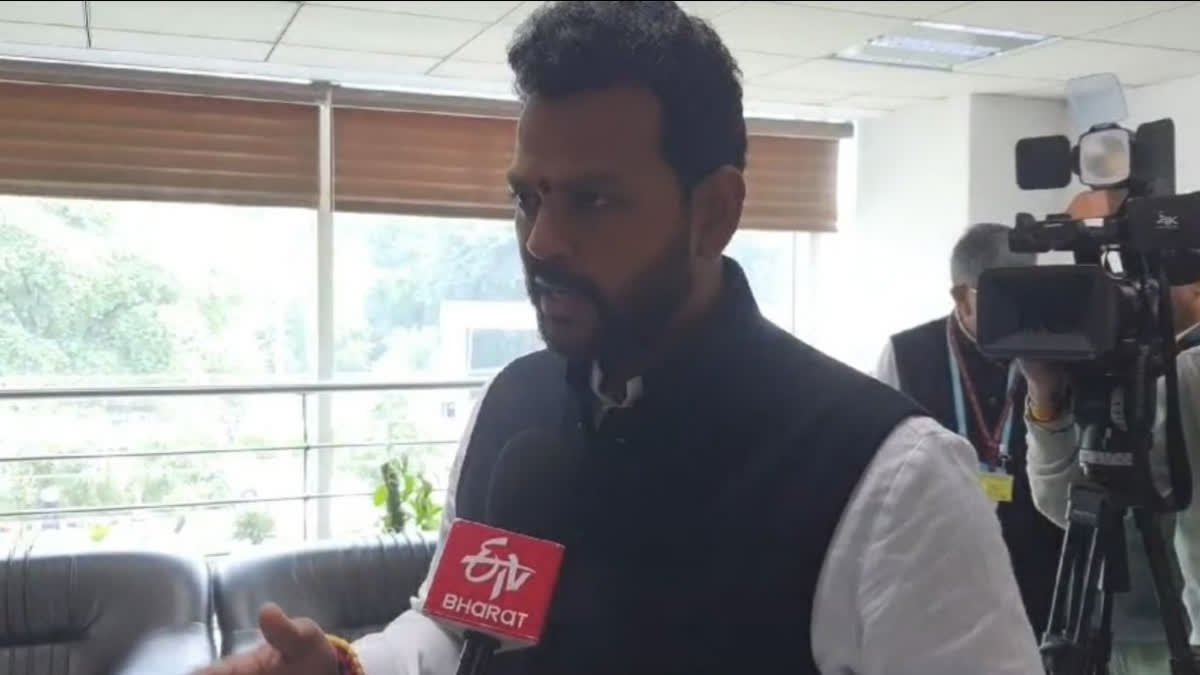New Delhi: Civil Aviation Minister K. Rammohan Naidu emphasised the critical need to develop aviation psychology and implement robust stress and fatigue management systems to ensure the safety of aircraft operations.
In an exclusive interview with ETV Bharat, he discussed ongoing efforts by the Ministry of Civil Aviation to reduce the occurrence of accidents and mishaps in the aviation sector.
At the Indian Aviation Academy here, the minister spoke at the Aircraft Accident Investigation Bureau (AAIB)-organised national symposium on Human Factors in Aircraft Accidents.
"We are discussing current aeroplane mishaps and accidents. The ministry has an aircraft accident investigation bureau. For the first time, they conducted a seminar with stakeholders to examine why accidents occur and how to reduce them. We want to reduce it collectively to zero," Naidu stated.
"We have an excellent ministry team. We are always striving towards this aim. I believe that having a seminar with industry stakeholders, calling everyone, sitting with them, discussing these issues and what is going on around the world, will help us improve our systems, so I believe that this is a very important step towards that goal, and I was actually proposing that this type of seminar be held every year where we bring it." added Naidu, also a TDP MP.
Naidu proposed that such seminars become an annual event, serving as a platform for ongoing discussions with stakeholders to identify global trends and strategies for reducing accidents.
Tackling Fog-Related Challenges in Aviation
When asked about the challenges posed by fog during the winter months, particularly in takeoffs and landings, Naidu explained that the ministry has implemented proactive measures.
"Regarding that scenario, we have already addressed it as this issue arises every year. So we convene a meeting before the season begins, bringing all stakeholders together to monitor and address the situation in advance," Naidu said.
He also highlighted a major upgrade to airport infrastructure in North India, where fog is a common problem. "We are converting the majority of airports to Category-III (CAT-3) standards, which allows aircraft to land and take off even in foggy conditions. We are constantly working to improve our airports, and the majority of airports in North India, where this issue is common, are being converted into CAD-3 airports," he added.
Human Factors and Safety in Aviation
At the event, Naidu also stressed that human factors are key contributors to aircraft accidents and that ensuring continued safety is a collective responsibility.
"Safety measures must keep pace with the rapid growth of the Indian aviation sector," Naidu emphasised, noting that India is one of the fastest-growing civil aviation markets in the world. Over 1,200 new planes have been ordered by Indian airlines, underscoring the need for advanced safety systems and protocols.
He also called for continuous skilling and upskilling of aviation personnel to maintain high safety standards. "We need to integrate advanced psychological aspects into training programs, including formal aviation psychology programs, which are currently lacking," he said. Stress and fatigue management programs, especially for pilots, were also highlighted as critical to the overall safety of aircraft operations.
Preparing for the Future
As India's aviation sector continues its rapid expansion, Naidu stressed the need for enhanced technical and cognitive skills for personnel in aircraft maintenance, noting that the growing number of planes will require a highly skilled workforce.
The minister’s remarks reinforced the government’s commitment to ensuring the safety and efficiency of India's burgeoning aviation industry, through both technological upgrades and human-centered safety measures.



